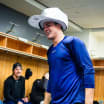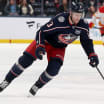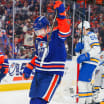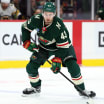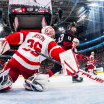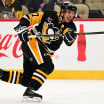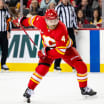Zubov on special delivery that led him to Stars, number retirement
Hall of Fame defenseman covers apprehension at playing in Dallas, why he wore No. 56 in Q&A with NHL.com
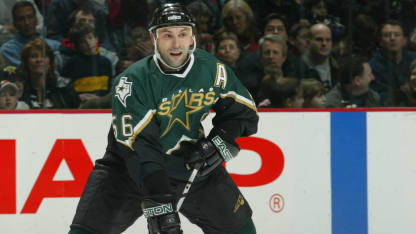
© B Bennett/Getty Images
The defenseman played the final 12 of his 16 NHL seasons with Dallas, helping them win the Stanley Cup in 1999. He leads all defensemen in Stars/Minnesota North Stars history in games (839), goals (111), assists (438) and points (549). Among all Stars/North Stars players, he's third in assists, fifth in games played and seventh in points.
Zubov joined the Stars in a trade with the Pittsburgh Penguins for defenseman
Kevin Hatcher
on June 22, 1996.
His initial reaction to the trade was not positive.
"That trade was made literally after the draft," Zubov said. "There were two and a half months left until training camp. I had started preparing for the season with the Penguins] as usual, but when this happened I immediately informed my agent that this team was probably not for me. The Stars had just moved to Texas a few years prior and weren't doing well in the standings.
Zubov changed his mind because of a special delivery from general manager Bob Gainey.
"I missed the first two weeks of [training
,
Alex Kovalev
and
Sergei Nemchinov
became the first Russia-born players to have their names engraved on the Cup.
Zubov played his final NHL game in 2009, finishing his career with 771 points (152 goals, 619 assists) in 1,068 games with the Stars, Rangers and Penguins. He was inducted into the Hockey Hall of Fame in 2019.
He will become the sixth player in Stars/Minnesota North Stars history to have his number retired, joining
Neal Broten
(No. 7, 1998),
Bill Goldsworthy
(No. 8, 1992),
Mike Modano
(No. 9, 2014),
Bill Masterton
(No. 17. 1987) and
Jere Lehtinen
(No. 26, 2017).
Before his number is raised to the rafters in Dallas, Zubov talked about his time his Dallas, why he wore No. 56, and looks back to some of his favorite memories in a Q&A with NHL.com:
You had a great career with the New York Rangers, where you won the Stanley Cup, and also with the Pittsburgh Penguins. Why do you think your number is being retired in Dallas?
"Those four seasons that I spent on the East Coast were probably better looking in terms of stats. But still, it was in Dallas where a very good team was being built for a long time, which I was lucky enough to be a part of. We were a closely knit team for many years. With the Stars, many guys took on key roles, became leaders, and together we were able to realize our potential. This also applies to coaches. We worked together for a long time, and there we fully realized ourselves."
How did your Stars teammates treat you in the locker room after you weren't sure you were willing to go there?
"From Day 1 when I was on the team, it was very understanding. Everyone supported and encouraged me, especially in the first few months. Figuratively speaking, they tried to drag me into their boat. And it wasn't just players who treated me this way, it was the whole organization, including the management and team owners. I had zero discomfort with anything."
In your third season in Dallas, the Stars made you an alternate captain, a role you had until you left the team in 2009. How did that come about?
"To be honest, I don't even remember how it happened. We had many leaders. Apparently the coaching staff thought that I was one of them. This definitely added more responsibility for the team and our results. I think this decision helped me more than it helped the team. It made me feel like I really had become an important part of the Dallas Stars."
You hold the Stars record for most total ice time: 19,506 minutes. That equates to one week, six days, 13 hours and 6 minutes. You also played 4,085:03 on the power play and 2,193:02 shorthanded, both more than any other player for the franchise. How did you manage this unreal workload?
"Coaches trusted me to play that much, and I did. With each season there was more and more trust from them in different game situations. There were quite a few games where we switched to playing just five or even four defensemen. It didn't bother me. I happily took on all those minutes."
With the Rangers you wore No. 21, with the Penguins you had No. 3, and the Stars are about to retire your No. 56. Why did you change them so much?
"I wore No. 3 with CSKA Kontinental Hockey League], but the Rangers had
[James Patrick
using it, so I had to pick a different one. They offered me No. 21, so I just took it.
"In Pittsburgh, No. 21 was retired in memory of
Michel Briere
, their young prospect who died in a car crash at the age of 21. What can you do? I took my old No. 3 back. But as soon as the season began, in the second or third game, I broke my finger. Missed a couple of weeks, put on a splint, and in the next game I broke another finger. Missed a total of 20 games. That started the whole conversation of my number being unlucky and I felt like I needed to do something. They offered me No. 36 and No. 56, as there weren't many options during the season. So I took 56. Guys on the Penguins] said, '
[Larry Murphy
wears No. 55, and you're better than him, so you should take a number one bigger than him.'"
You scored three overtime goals for the Stars. Can you remember at least one of them?
"The most memorable was
at home against New Jersey
with
Martin Brodeur
in goal. I got open in a soft spot in the offensive zone and managed to put the puck under his blocker in the far corner."
Your stick is now being sold at an online auction for a lot of money. Whose stick would you be willing to buy yourself?
"I have a home collection of about 20-25 sticks. I have one from
Brett Hull
,
Teemu Selanne
,
Joe Sakic
,
Brian Leetch
, Mike Modano. Old sticks, all made of titanium. Selanne's stick is from very early in his NHL career. The one thing I should have done many years ago was get a stick from a rookie named Alex Ovechkin. That's the one my collection is still missing."
